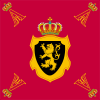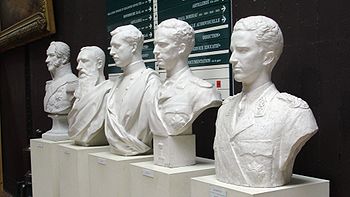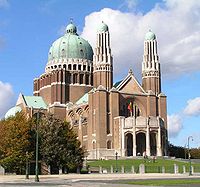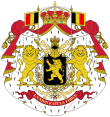- Monarchy of Belgium
-
King of the Belgians Monarchy Federal 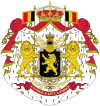
Coat of Arms of Belgium
Incumbent:
Albert IIStyle: His Majesty Heir apparent: Prince Philippe, Duke of Brabant First monarch: Leopold I of Belgium Formation: 21 July 1831 Belgium 
This article is part of the series:
Politics and government of
BelgiumMonarchyFederal JudiciarySubdivisionsRelated subjects
Monarchy in Belgium is constitutional and popular in nature. The hereditary monarch, at present Albert II, is the head of state and is officially called King of the Belgians (Dutch: Koning der Belgen, French: Roi des Belges, German: König der Belgier).
Contents
Origins
When Belgium became independent in 1830 the National Congress chose a constitutional monarchy as the form of government. The Congress voted on the question on 22 November 1830, supporting monarchy by 174 votes to 13. In February 1831, the Congress nominated Louis, Duke of Nemours, the son of the French king Louis-Philippe, but international considerations deterred Louis-Philippe from accepting the honour for his son.
Following this refusal, the National Congress appointed Erasme-Louis, Baron Surlet de Chokier to be the Regent of Belgium on 25 February 1831, thus becoming the first head of state of independent Belgium. Leopold of Saxe-Coburg and Gotha was designated as King of the Belgians by the National Congress [1] and swore allegiance to the Belgian constitution in front of Sint Jacobs Church at Coudenberg Palace in Brussels on July 21. This day has since become a national holiday for Belgium and its citizens.
A hereditary and constitutional system
As a hereditary constitutional monarchy system, the role and operation of Belgium's monarchy is governed by the Constitution. The royal office of King is designated solely for a descendent of the first King of the Belgians, Leopold I.
Since he is bound by the Constitution [2](above all other ideological and religious considerations, political opinions and debates and economic interests) the King acts as an arbiter and guardian of Belgium's unity and independence. Belgium's monarchs are inaugurated without the blessing of the Catholic Church in a purely civil swearing-in ceremony. These words (above all other ideological and religious considerations, political opinions and debates and economic interests) are not written in the Belgian constitution: nevertheless, they conform with the spirit of this Constitution. There have occurrences, however, of Belgian monarchs not always respecting this spirit.
A constitutional monarchy from the beginning
The Kingdom of Belgium was never an absolute monarchy. Nevertheless, in 1961, the historian Ramon Arango, wrote that the Belgian monarchy is not truly constitutional.[3]
Leopold I, Leopold II, Albert I
Leopold I of Belgium was head of Foreign Affairs as an ancient régime monarch, the foreign ministers having the authority to do so only as ministers of the king.[4] Leopold I quickly became one of the most important shareholders of the Société Générale de Belgique [5] In many circumstances Leopold's son, Leopold II of Belgium, publicly expressed opinion against that of the Government (on 15 August 1887, against Prime Minister Auguste Marie François Beernaert), or some MP's (again against Beernaert in 1905).[6] For Yvon Gouet this behavior was not in compliance with the parliamentary system.[7] Also, at the start of World War I, Albert I of Belgium stated he was in command of the Belgian army contrary to his Prime Minister Charles de Broqueville and, according to Raymond Fusilier, also against the Belgian Constitution [8] Luc Schepens wrote similar opinions:"The two main casualties of World War I are the Constitution and the parliamentary regime. The king had a role out of proportion with the spirit of the Constitution".[9] For instance, on 17 May 1926, in a public letter, Albert stated he had faith in the Henri Jaspar government, before the Parliament passed a vote of confidence in this government.[10]
Leopold III, Baudouin I
Louis Wodon (the chef de cabinet of Leopold III from 1934 to 1940), thought the King's oath to the Constitution implied a royal position over and above the Constitution. He compared the King to a father, the head of a family [11] According to Arango, Leopold III of Belgium shared these views about the Belgian monarchy. In 1991, towards the end of the reign of Baudouin I, Senator Yves de Wasseige, a former member of the Belgian Constitutional Court, cited four points of democracy which the Belgian Constitution lacks: 1. the King chooses the ministers, 2. the King is able to influence the ministers when he speaks with them about bills, projects and nominations, 3. the King promulgates bills, and, 4. the King must agree to any change of the Constitution[12]
Constitutional, political and historical consequences
The Belgian monarchy was immediately a constitutional monarchy, patterned after that of the United Kingdom.[13][14] "It should be observed that all monarchies have suffered periods of change as a result of which the power of the sovereign was reduced, but for the most part those periods occurred before the development of the system of constitutionnal monarchy and were steps leading to its establishment.".[15] The characteristic evidence of this is in Great Britain where there was an evolution from the time when kings ruled through the agency of ministers to that time when ministers began to govern through the instrumentality of the Crown.
Unlike the British constitutional system, in Belgium the monarchy underwent a belated evolution which came after [16] the establishment of the constitutional monarchical system [17] because, in 1830-1831, an independent state, parliamentary system and monarchy were established simultaneously. Hans Daalder, Professor of political science at the Rijksuniversiteit Leiden wrote: "Did such simultaneous developments not result in a possible failure to lay down the limits of the royal prerogratives with some precision - which implied that the view of the King as the Keeper of the Nation, with rights and duties of its own, retained legitimacy?" [18]
For Raymond Fusilier, the Belgian monarchy had to be placed - at least in the beginning - between the regimes where the king rules and the regime when the king does not rule but only reigns. The Belgian monarchy is closer to the principle the King does not rule [19] But the Belgian kings were not only at the head of the dignified part of the Constitution.[20] The Belgian monarchy is not merely symbolic, because it rules as far as the King agrees with his ministers.[21] For Francis Delpérée, to reign does not only mean to preside over ceremonies but also to take a part in the running of the State.[22] The Belgian historian Jean Stengers wrote that some foreigners believe the monarchy is indispensable to national unity. The King is but a piece over the political scene (in French literally translated: on the chessboard), but a piece which matters.[23]
The monarch is the result not the cause of homogeneity and consensus
Author Ramon Arango thought that the Belgian monarchy is not truly constitutional or is perhaps a constitutional monarchy but whose sovereign is granted power disproportionate to that of a constitutional monarch in order that he accomplish an authoritative function, the maintenance of national unity [24] mainly above the provincial conflicts of Wallonia and Flanders but also above other conflicts. Arango concluded by saying about the General strike against Leopold III of Belgium: Why had the major antagonists reached such an impasse by midsummer of 1950? A modern constitutional monarch is the embodiment of historical unity and national self-identification, but he functions successfully in this capacity only if there already exists a tradition common to each of his subjects and if the people, of which he is the reflection, are whole and able to be mirrored in a single, undistorted image. The monarch, in other words, is the result, not the cause of homogeneity and consensus. The question of consensus is at the center of the royal question. For the average Belgian, the affair focused all the other issues over which there was a lack of harmony in Belgian society – the ethnic, linguistic, religious, and economic problems... [25]
Arango is of the opinion that the inhabitants of Belgium do not share a common tradition but that throughout the centuries the Flemish and Walloons maintained separate identities. He wrote that, at the time of the Belgian revolution of 1830, they were still separate, living in separate territories from the beginning, "and even to the present".[26]
List of Kings of the Belgians
To date all have belonged to the House of Saxe-Coburg and Gotha
Title
The proper title of the Belgian monarch is King of the Belgians rather than "King of Belgium". The title "King of the Belgians" indicates a popular monarchy linked to the people of Belgium (i.e., a living and hereditary Head of State; yet ratified by popular will), whereas the former would indicate standard constitutional or absolute monarchy linked to territory or state. For example, in 1830, King Louis Philippe was proclaimed "King of the French" rather than "King of France". The Greek monarch was titled "King of the Hellenes", indicating a personal link with the people, not just the state. Moreover, the Latin translation of "King of Belgium" would have been Rex Belgii, which from 1815 was the name for the King of the Netherlands. Therefore, the Belgian separatists chose Rex Belgarum.
Belgium is the only current European monarchy that does not apply the tradition of the new monarch automatically ascending the throne upon the death or abdication of the former monarch. According to the Belgian constitution, the monarch accedes to the throne only upon taking a constitutional oath. The present king did not become monarch on July 31, 1993 (the day his brother died) but on August 9, 1993 when he took the constitutional oath.[citation needed][dubious ] In all other European monarchies, the monarch assumes the title the moment the predecessor dies or abdicates. The Belgian constitutional oath is as follows: "I swear to observe the Constitution and the laws of the Belgian people, to maintain the national independence and the integrity of the territory.", which is taken in the three official languages: French, Dutch and German.
Members of the Belgian Royal Family are often known by two names: a Dutch and a French one. For example, the current heir-apparent is called 'Philippe' in French and 'Filip' in Dutch; the fifth King of the Belgians was 'Baudouin' in French and 'Boudewijn' in Dutch.
In the other official language of German monarchs are usually referred to by their French names. The same is true for English (with the exception of Leopold, where the accent is removed for the purpose of simplicity).

Constitutional role
The Belgian monarchy symbolises and maintains a feeling of national unity by representing the country in public functions and international meetings.
In addition, the monarch has a number of responsibilities in the process of the formation of the Government. The procedure usually begins with the nomination of the "Informateur" by the monarch. After the general election the Informateur officially informs the monarch of the main political formations which may be available for governance. After this phase, the monarch can appoint another "informateur" or appoint a "Formateur", who will have the charge of forming a new government, of which he/she generally becomes the Prime Minister.
The Belgian Constitution entrusts the monarch with federal executive powers: the appointment and dismissal of ministers, the implementation of the laws passed by the Federal Parliament, the submission of bills to the Federal Parliament and the management of international relations. The monarch sanctions and promulgates all laws passed by Parliament. In accordance with Article 106 of the Belgian Constitution, the monarch cannot act without the countersignature of the responsible minister, who in doing so assumes political responsibility. This means that federal executive power is exercised in practice by the Federal Government, which is accountable to the Chamber of Representatives in accordance with Article 101 of the Constitution.
The monarch receives the prime minister at the Palace of Brussels at least once a week, and also regularly calls other members of the government to the palace in order to discuss political matters. During these meetings, the monarch has the right to be informed of proposed governmental policies, the right to advise, and the right to warn on any matter as the monarch sees fit. The monarch also holds meetings with the leaders of all the major political parties and regular members of parliament. All of these meetings are organised by the monarch's personal political cabinet which is part of the Royal Household.
The monarch is the Commander-in-Chief of the Belgian Armed Forces and makes appointments to the higher positions. The names of the nominees are sent to the monarch by the Ministry of Defence. The monarch's military duties are carried out with the help of the Military Household which is headed by a General office. Belgians may write to the monarch when they meet difficulties with administrative powers.
The monarch is also one of the three components of the federal legislative power, in accordance with the Belgian Constitution, together with the two chambers of the Federal Parliament: the Chamber of Representatives and the Senate. All laws passed by the Federal Parliament must be signed and promulgated by the monarch.
Inviolability
Article 88 of the Belgian Constitution provides that "the King's person is inviolable, his ministers are responsible". This means that the King cannot be prosecuted, arrested or convicted of crimes, cannot be summoned to appear before a civil court and is not accountable to the Federal Parliament. This inviolability was deemed incompatible with Article 27 of the Rome Statute of the International Criminal Court which states that official capacity shall not exempt a person from criminal responsibility under the statute.[27]
Royal Household
The King's Household (Dutch: Het Huis van de Koning, French: La Maison du Roi, German: Das Haus des Königs) was reorganised in 2006, and consists of seven autonomous departments and the Court's Steering Committee. Each Head of Department is responsible for his department and is accountable to the King.
The following departments currently make up the King's Household:
- the Department for Economic, Social and Cultural Affairs
- the King's Cabinet
- the King's Military Household
- the King's Civil List
- the Department for Foreign Relations
- the Department of the Protocol of the Court
- the Department of Petitions
The King's Chief of Cabinet is responsible for dealing with political and administrative matters and for maintaining the relations with the government, trade unions and industrial circles. In relation to the King, the Chief assists in keeping track of current events; informs regarding all aspects of Belgian life; proposes and prepares audiences; assists in preparing speeches and informs the King about developments in international affairs. The Chief of Cabinet is assisted by the Deputy and Legal Adviser, the Press Adviser and the Archivist. The incumbent Chief of Cabinet is Jacques van Ypersele de Strihou, who is reportedly sometimes referred to as viceroy, Richelieu or Rasputin.[28]
The Head of the King's Military Household assists the King in fulfilling his duties in the field of defence. He informs the King about all matters of security, defence policy, the views of Belgium's main partner countries and all aspects of the Belgian Armed Forces. He organises the King's contacts with the Armed Forces, advises in the fields of scientific research and police and coordinates matters with patriotic associations and former service personnel. The Military Household is also responsible for managing the Palace's computer system. The Head of the Military Household is a General Officer, currently General Jef Van den put and assisted by an adviser, currently Lieutenant-Colonel Aviator Serge Vassart. The King's Aides-de-Camp and the King's Equerries are also attached to the Military Household.
The King's Aides-de-Camp are senior officers chosen by the monarch and charged with carrying out certain tasks on his behalf, such as representing him at events. The King's Equerries are young officers who take turns prepareing the King's activities, informing him about all the aspects that may be important to him and providing any other useful services such as announcing visitors. The Equerry accompanies the King on his trips except for those of a strictly private nature.
The Intendant of the King's Civil List is responsible for managing the material, financial and human resources of the King's Household. He is assisted by the Commandant of the Royal Palaces, the Treasurer of the King's Civil List and the Civil List Adviser. The Intendant of the Civil List also advises the King in the field of energy, sciences and culture and administers the King's hunting rights. The Commandant of the Royal Palaces is mainly in charge, in close cooperation with the Chief of Protocol, of the logistic support of activities and the maintenance and cleaning of the Palaces, Castles and Residences. He is also Director of the Royal Hunts.
The Chief of Protocol is charged with organising the public engagements of the King and the Queen, such as audiences, receptions and official banquets at the Palace, as well as formal activities outside of the Palace. He is assisted by the Queen's Secretary, who is mainly responsible for proposing and preparing the Queen's audiences and visits.
The Head of the Department for Economic, Social and Cultural Affairs advises the King in the economic, social and cultural fields. He is also responsible for providing coordination between the various Households and Services and for organising and minuting the meetings of the Steering Committee. The Head of the Department for Foreign Relations informs the King of developments in international policy, assists the King from a diplomatic viewpoint on royal visits abroad and prepares the King's audiences in the international field. He is also responsible for maintaining contacts with foreign diplomatic missions. The Head of the Department of Petitions is charged with processing petitions and requests for social aid addressed the King, the Queen or other members of the Royal Family. He is also responsible for the analysis and coordination of royal favours and activities relating to jubilees, and advises the King in the fields for which he is responsible.
For the personal protection of the King and the Royal Family, as well as for the surveillance of the royal estates, the Belgian Federal Police at all times provides a Security Detail to the Royal Palace, commanded by a Chief Police Commissioner.
There are currently two other Households at the Belgian Court: the Household of Her Majesty Queen Fabiola and the Household of Their Royal Highnesses the Duke and Duchess of Brabant. The other members of the Royal Family have a Service at their disposal.
Members of the Belgian Royal Family
Members of the Royal Family hold the title Prince (Princess) of Belgium with the style of Royal Highness. Prior to World War I they used the additional titles Prince (Princess) of Saxe-Coburg and Gotha and Duke (Duchess) of Saxony as members of the House of Wettin. The children and husband of Princess Astrid would not be entitled to these titles as they belong to a different agnatic line, the House of Habsburg-Lorraine-Este.
- Prince Philippe, Duke of Brabant (born April 15, 1960). He married, on December 4, 1999, Jonkvrouwe Mathilde d'Udekem d'Acoz, who was created HRH Princess Mathilde of Belgium a day before their marriage. She is a daughter of the late Count Patrick d'Udekem d'Acoz and his wife, Countess Anna Maria Komorowska. They have four children:
- Princess Elisabeth of Belgium, who will inherit the throne after her father, due to a 1991 act of succession which created full cognatic primogeniture, altering the order of succession from eldest son to eldest child.
- Prince Gabriel of Belgium
- Prince Emmanuel of Belgium
- Princess Eléonore of Belgium.
- Princess Astrid of Belgium (born June 5, 1962). She is the wife of His Imperial and Royal Highness Archduke Lorenz of Austria-Este, Archduke of Austria, Duke of Modena, Prince Royal of Hungary and Bohemia, whom she married on September 22, 1984 and who was created a Prince of Belgium in 1995. Princess Astrid, with her own descendants, is before her brother Laurent in the order of succession to the Belgian throne, due to the 1991 act of succession mentioned above. They have five children:
- Prince Laurent of Belgium (born October 19, 1963). He married Claire Coombs, an Anglo-Belgian former land surveyor, on April 12, 2003. She was created HRH Princess Claire of Belgium 11 days before their marriage. They have one daughter and two sons:
Queens consort
- Queen Louise — Louise d'Orléans (second wife of King Leopold I, whose first wife Princess Charlotte of Wales had died before he came to the throne. Subsequently, Leopold's only daughter, Carlota of Mexico, was named after her.)
- Queen Marie Henriette — Marie Henriette of Austria (wife of King Leopold II)
- Queen Elisabeth — Elisabeth of Bavaria) (wife of Albert I)
- Queen Astrid — Astrid of Sweden (wife of King Leopold III)
- Princess Lilian — Mary Lilian Baels (as Princess de Réthy second wife of King Leopold III)
- Queen Fabiola — Fabiola de Mora y Aragón (wife of King Baudouin)
- Queen Paola — Paola Ruffo di Calabria (wife of King Albert II)
See also
References
- ^ http://www.monarchie.be/history
- ^ http://www.dekamer.be/kvvcr/pdf_sections/publications/constitution/grondwetEN.pdf
- ^ Ramon Arango, Leopold III and the Belgian Royal Question, The John Hopkins Press, Baltimore, 1961, p.9.
- ^ French : dirigeant personnellement les Affaires étrangères, comme un souverain d'Ancien Régime, en discutant toutes les questions importantes avec ses ministres, ceux-ci n'ayant d'autorité que pour autant qu'ils étaient ministres du roi... Frans Van Kalken, in La Belgique contemporaine, Paris, Armand Colin, 1950, p. 43.
- ^ Pierre Lebrun P.Lebrun, Essai sur la révolution industrielle en Belgique, 1770-1847, Palais des Académies, Bruxelles, 2e édition, 1981.
- ^ Raymond Fusilier, Les monarchies parlementaires en Europe Editions ouvrières, Paris, 1960, p. 399.
- ^ Yvon Gouet, De l'unité du cabinet parlementaire, Dalloz, 1930, p. 232, quoted by Raymond Fusilier, p. 400.
- ^ Raymond Fusilier, Les monarchies parlementaires en Europe, p. 424.
- ^ French Les deux grandes victimes de la guerre 14-18 en Belgique semblent être la Constitution et la démocratie parlementaire. Et cela n'alla pas sans conséquences. Pendant la suite du règne d'Albert Ier, et également sous celui de Léopold III, le roi a exercé au sein du pouvoir exécutif un rôle hors de proportion avec ce qui avait été de coutume avant la Première Guerre mondiale (...) Ce n'est qu'après que cette situation s'est normalisée. in Albert I et le Gouvernement Broquville, Duculot, Gembloux, 1988, p. 230. ISBN 2-8011-0464-7
- ^ The king wrote : Pour vaincre les périls actuels, il faut faire trêve à tous dissentiments in Emmanuel Gérard, La démocratie rêvée, bridée et bafouée, 1918-1939, Editions Complexe, p. 109. ISBN 2-8048-0083-0
- ^ Regarding the moral mission of the king it is permissible to point to a certain analogy between his role and that of a father, or more generally, of parents in a family. The family is, of course, a legal institution as is the state. But what would a family be where everything was limited among those who compose it to simply legal relationships? In a family when one considers only legal relationships one comes very close to a breakdown in the moral ties founded on reciprocal affection without which a family would be like any other fragile association quoted by Arango, Leopold III and the Belgian Royal Question, p. 31.
- ^ Yves de Wasseige, Le roi, la loi la liberté: inconciliables en démocratie? in Les faces cachées de la monarchie belge, TOUDI (n° 5/Contradictions (n° 65/66), 1991, ISBN 2-87090-010-4
- ^ Ramon Arango, Leopold III and the Belgian Royal Question, p.9.
- ^ Raymond Fusilier in Les monarchies parlementaires en Europe, Editions ouvrières, Paris, 1960, p. 350, wrote the Belgian regime of 1830 was also inspired by the French Constitution of the Kingdom of France (1791-1792), the United States Declaration of Independence of 1776 and the old political traditions of both Walloon and Flemish provinces.
- ^ Ramon Arango, p. 9.
- ^ Underlined by Arango.
- ^ R.Arango, p. 12.
- ^ Hans Daalder, The monarchy in a parliamentary system, in Res Publica, Tijdschrift voor Politologie, Revue de Science Politique, Belgian Journal of Political Science, nummer 1, 1991, pp. 70-81, p. 74.
- '^ Raymond Fusilier, Les monarchies parlementaires - étude sur les systèmes de gouvernement en Suède, Norvège, Luxembourg, Belgique, Pays-bas, Danemark, Editions ouvrières, Paris, 1960, pp. 419-420.
- ^ Bagehot, The English Constitution
- ^ R.Fusilier, pp. 419-420. French Elle n'est pas purement symbolique, car elle participe à la direction des affaires de l'Etat dans la mesure où sa volonté coïncide avec la volonté des ministres, lesquels seuls assument la responsabilité de la politique du gouvenement.
- ^ French Le Roi règne. Pendant plus d'un siècle et demi (...) on ne s'est guère interrogé sur cette maxime. Ou bien on a cherché à lui donner un sens réducteur. Le Roi préside les Te Deum et les cérémonies protocolaires (...) Régner ne signifie pas suivre d'un oeil distrait les occupations du gouvernement (...) C'est contribuer (...) au fonctionnement harmonieux de l'Etat, in La Libre Belgique (April 1990) quoted by Les faces cachées de la monnarchie belge, Contradictions, nummer 65-66, 1991, p. 27. ISBN 2-87090-010-4
- ^ French Certains étrangers croient - ils le disent souvent - que le maintien de l'unité belge tient à la personne du Roi. Cela est d'une grande naïveté. Il n'est qu'une pièce sur l'échiquier. Mais, sur l'échiquier, le Roi est une pièce qui compte. in Jean Stengers, L'action du roi en Belgique depuis 1831, Duculot, Gembloux, 1992, p. 312. ISBN 2-8011-1026-4
- ^ Ramon Arango, Leopold III and the Belgian Royal Question, p. 9.
- ^ Ramon Arango, pp. 212-213.
- ^ Leopold III and the Belgian Royal Question, p.13
- ^ "Minutes of the Belgian Senate of September 9, 2004" (in Dutch). The Belgian Senate. http://www.senate.be/www/?MIval=/publications/viewPubDoc&TID=50337504&LANG=nl. Retrieved 2007-09-17.
- ^ Van Den Driessche, Pol (2007) (in Dutch). Over leven in de Wetstraat: 25 jaar politiek journalist. Leuven: Uitgeverij Van Halewyck. pp. p. 94. ISBN 978-90-5617-824-6. "In Wetstraat-kringen heeft hij verschillende bijnamen, van vriendelijk tot boosaardig: Van Ypersele wordt - naargelang van de situatie - onderkoning, Richelieu or Raspoetin genoemd."
External links
- The Belgian monarchy - official site of the Belgian Royal Family
- The Belgian monarchy - official brochure of the Belgium government
- What role for a Belgian monarch? - website Expatica.com
Heads of state of the European Union member states - Fischer (AT)
- Albert II (BE)
- Parvanov (BG)
- Christofias (CY)
- Klaus (CZ)
- Margrethe II (DK)
- Ilves (EE)
- Halonen (FI)
- Sarkozy (FR)
- Wulff (DE)
- Papoulias (GR)
- Schmitt (HU)
- Higgins (IE)
- Napolitano (IT)
- Bērziņš (LV)
- Grybauskaitė (LT)
- Henri (LU)
- Abela (MT)
- Beatrix (NL)
- Komorowski (PL)
- Cavaco Silva (PT)
- Băsescu (RO)
- Gašparovič (SK)
- Türk (SI)
- Juan Carlos I (ES)
- Carl XVI Gustaf (SE)
- Elizabeth II (UK)
Heads of state and government of Europe Heads of state States recognised by the United NationsAlbania · Andorra · Armenia1 · Austria · Azerbaijan1 · Belarus · Belgium · Bosnia and Herzegovina · Bulgaria · Croatia · Cyprus1 · Czech Republic · Denmark · Estonia · Finland · France · Georgia1 · Germany · Greece · Hungary · Iceland · Ireland · Italy · Kazakhstan1 · Latvia · Liechtenstein · Lithuania · Luxembourg · Macedonia · Malta · Moldova · Monaco · Montenegro · Netherlands · Norway · Poland · Portugal · Romania · Russian Federation1 · San Marino · Serbia · Slovakia · Slovenia · Spain · Sweden · Switzerland · Turkey1 · Ukraine · United Kingdom · Vatican CityStates recognised by at least one United Nations memberStates not recognised by any United Nations membersHeads of government States recognised by the United NationsAlbania · Andorra · Armenia1 · Austria · Azerbaijan1 · Belarus · Belgium · Bosnia and Herzegovina · Bulgaria · Croatia · Cyprus1 · Czech Republic · Denmark · Estonia · Finland · France · Georgia1 · Germany · Greece · Hungary · Iceland · Ireland · Italy · Kazakhstan1 · Latvia · Liechtenstein · Lithuania · Luxembourg · Macedonia · Malta · Moldova · Monaco · Montenegro · Netherlands · Norway · Poland · Portugal · Romania · Russian Federation1 · San Marino · Serbia · Slovakia · Slovenia · Spain · Sweden · Switzerland · Turkey1 · Ukraine · United Kingdom · Vatican CityStates recognised by at least one United Nations memberStates not recognised by any United Nations members1 Partially or entirely in Asia, depending on the definition of the border between Europe and Asia.Reigning Belgium · Denmark · Liechtenstein · Luxembourg · Monaco · Netherlands · Norway · Spain · Sweden · United KingdomNon reigning Categories:- Belgian monarchy
- Lists of monarchs
- Current monarchies
Wikimedia Foundation. 2010.

